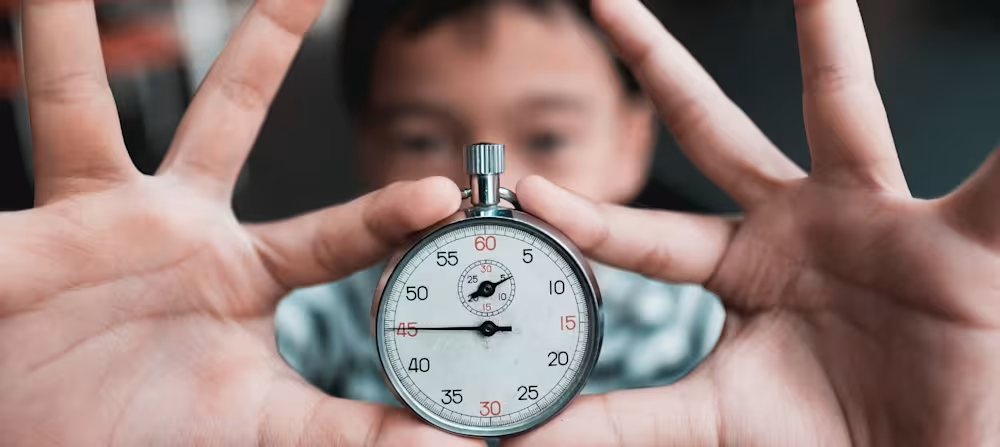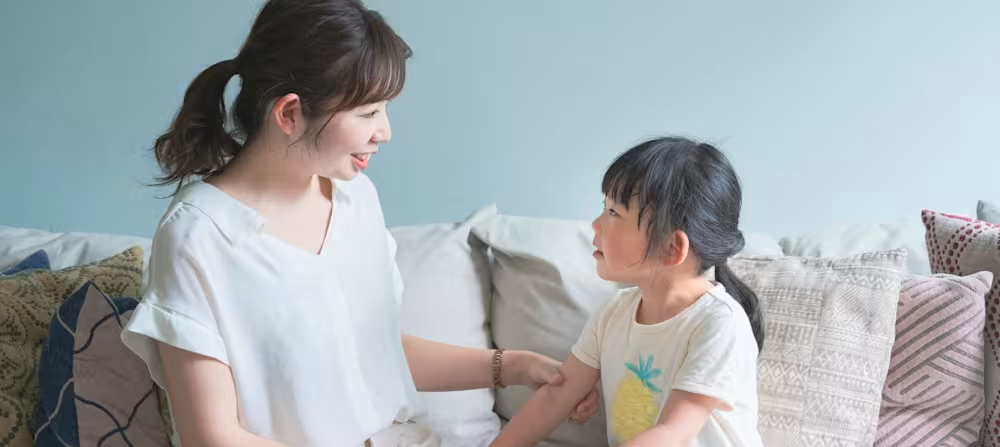Screen time for toddlers and babies: How much is too much?
Updated Jan 20, 2026

For many parents, turning the TV on for their child can come with a cost: guilt and worry. Let’s start off by saying - No, you are not ruining your child!
With screen time going up in many households due to the pandemic, choosing whether or not to turn on the TV for our kiddos is becoming a frequent parenting scenario. Screens are here to stay, that is a given, so what is the best choice to make? Thankfully, in parenting, this is one of those topics that doesn’t have to be black or white, it is all about balance.
But what do the experts recommend around screen time? What does the research say? In this article, we dive deep into screen time for toddlers and babies, so that you can decide how to manage screen time at home in a way that falls within your parenting ideals (and guilt-free!).
AAP guidelines for screen time recommendations by age
Babies (<1 year)
The American Academy of Pediatrics (AAP) recommends no screen time for babies under 18 months of age. Because of their need for hands-on exploration for learning, children 2 years of age and younger can not learn anything from screen time []. The AAP does not count video chatting (think Facetime calls with grandma) as screen time.
Toddlers
For children 18 to 24 months of age, the AAP recommends limiting media to less than an hour per day, with parents curating what their child views and opting to choose high-quality programming. Additionally, the entity encourages the parents to watch the content along with the children, to encourage learning, and to never let them use media by themselves at this age.
Preschool-aged children
The AAP recommends that children from 2 to 5 years of age engage in one hour or less of high-quality programming per day, preferably with an adult companionship to help them make sense of what they are seeing. Research has demonstrated [] that children 3 to 5 years of age can benefit academically from well-designed television programs (think Sesame Street or PBS Kids).
Is screen time bad for toddlers?
OK so now we know that preschoolers can actually learn from TV time (Yay!), but, can too much screen time be bad?
Effects of too much screen time
In terms of child development, some studies have found [] that excessive television in early childhood can cause social/emotional delays, mainly due to the decrease in time that the child spends with parental or adult interaction. Babies learn from caregivers, not from screens, so higher screen time is associated with cognitive and language delays as well. It is important to note that these population-based studies are often done on families with low income, which due to other circumstances, reduces the consistency of a parenting presence and parenting interactions. Other studies have shown that educational content, combined with warm parenting practices, shows positive outcomes for children. (See why it’s not a straight-answer situation?)
Does screen time change behavior/cause behavior problems?
Depending on the content and the duration of the screen time, some infants and small children can display immediate changes in behavior right after being exposed to digital devices. For preschool-age children, some fast-paced images can have an immediate impact on their executive functioning [], and for many children, excessive screen time, especially leading right up to bedtime, can cause resistance in falling asleep, night wakings, and decreased sleep duration.
Signs of too much screen time
Some immediate signs of too much screen time can be displayed as:
Lack of physical activity
Decreased sleep time or poorer quality of sleep (think night terrors, early morning wakings, multiple night wakings)
Difficulties with regulating their emotions
Aggressive behaviors
While some of these behaviors can be caused by other factors, each parent knows their child best. If your child is usually well-tempered but exhibits more tantrums right after a long period of screen time, you can probably tell what the direct cause was, especially if it’s a recurrent trend. In terms of research, further investigation has to be done [] in order to continue studying the use of screens and the developing brain of babies and toddlers.
3 Tips to reduce screen time for toddlers
So, based on the research mentioned above, and the observations you have made about screen time usage and your own child, you may want to make some modifications to your child’s current screen time use. Here are some helpful tips:
Tip #1 Make a plan
First, determine what screen time you want to cut back on. Would you want your child to watch less TV in the morning or the afternoon? Do you want to cut screen time right before their nap? Knowing in what moments you want your child to do something else other than watch Cocomelon can help you anticipate what mood your child will be in, decide if you can actually be fully present for them at that moment, and prepare in advance any activity that you want to offer your child instead of TV.
For example, deciding to cut back on your toddler’s screen time before nap time, when you usually have Zoom calls around that time, might not be the best idea! If you are a morning person and your child usually watches some television while you prepare some breakfast, ask them for help making breakfast and avoid some screen time then.
Tip #2 Busy boxes and sensory bins
Your child will probably be upset that they won’t get to see their favorite TV show when they usually do, so be prepared to offer a new activity that sparks their interest. Busy boxes or sensory bins are a great way to offer an innovative, sensory experience with things you can find at home. These encourage your child to engage in independent play and they are also contained, which means they are usually, mess-free.
Here’s an idea for a quick one: Blend some cheerios in a blender or food processor to quickly make some “edible” sand. Place it in a plastic bin, drop in some small toys (magnetic letters, animals, whatever you find), and encourage your child to dig up the items with a spoon!
Tip #3 Encourage self-led play
I know, I know - this one might seem impossible! Believe it or not, toddlers and preschoolers need to experience boredom in order to spark their interest to explore toys and games. First, create a child-safe space where your child can explore and move around freely. Then, offer 2 - 3 toys that your child can play with in different ways. Avoid toys with lights or music, as these usually limit what a child can do with them. Finally, manage your expectations! It is normal that at first, you might have to play together with your child before they feel confident enough to play on their own. Once you think they are ready, tell them where you will be and what you will be doing while they play independently. Start with small periods of time (think 10 - 15 minutes), and then slowly build up on that. Remember to keep it fun and swap the toys you offer every so often so that it feels new to your kiddo.
How to use a timer for screen time
If screen time is a very common activity in your household, and you wish to scale back, it might be easier for you to start reducing the time your child spends in front of the screen at different times, rather than deleting whole sessions of screen time all at once. It is completely normal for children to experience strong feelings when the TV gets turned off. After all, having trouble with transitions is kind of their job. Introducing a to help your child anticipate when the TV gets turned off can be a great strategy for managing transitions. Right before the TV gets turned on, place a visual timer next to the TV and explain to your child, while making eye contact, what will happen when the timer goes off. When the time to turn off the screen comes, use an to explain that the timer is done and that it is now time to say goodbye to the TV. Expect some protests the first few times you do this, but with patience and consistency, your child will begin to understand screen time has a beginning and an end.
Takeaway
Screen time is a complex issue: Research and expert guidance suggest that balance, quality, and context matter more than strict avoidance.
Age matters: Babies learn best from real-world interaction, while older toddlers and preschoolers can benefit from limited, high-quality programming when adults are involved.
Too much can crowd out connection: Excessive screen use may affect sleep, behavior, and emotional regulation, especially when it replaces caregiver interaction or happens too close to bedtime.
Consider content and timing: Slower-paced, educational shows and shared viewing tend to be more supportive than fast-paced or solo screen use.
Small changes can help: Having a plan, offering engaging alternatives, and using tools like timers can help reduce screen time without power struggles or guilt.
Share article:
Note: The content on this site is for informational purposes only and should not replace medical advice from your doctor, pediatrician, or medical professional. If you have questions or concerns, you should contact a medical professional.
10 Sources
Share article:






